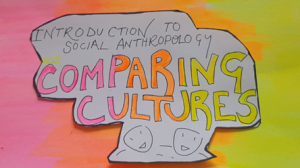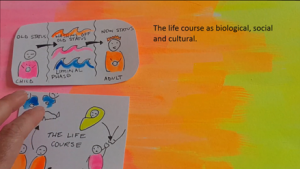Dr Sarah Winkler-Reid, Lecturer in Social Anthropology & Professor Cate Degnen
School of Geography, Politics & Social Sciences
Faculty of Humanities and Social Sciences
What did you do?
We redesigned the module to respond to the pandemic context and online teaching, as well as large student numbers (136) and still meet the core objectives of the module, Comparing Cultures: An Introduction to Social Anthropology.
- To introduce students to the discipline of social anthropology and share our passion for the discipline.
- To provide students with the experiencing of being an anthropologist, through the experience of conducting ethnographic research and cross-cultural exchange.
- To provide a scaffolding for students as they enter university, to help them to make the step into higher education, orientate themselves and understand what is required for success in their degree studies.


Who is involved?
Dr Sarah Winkler-Reid, Lecturer in Social Anthropology Geography, Politics & Sociology
Professor Cathrine Degnen, Professor-Social & Cultural Anthropology Geography, Politics & Sociology
We also worked with Dr Audrey Ricke, Senior Lecturer in Anthropology, Indiana University School of Liberal Arts at IUPUI, Indianapolis, Indiana, USA on the virtual exchange.
How did you do it?
Over the summer we redesigned the module to make it appropriate for online learning.
The module is structured according to five, two-week topics. Each topic contained; three – four pre-recorded ‘mini lectures’ (10 – 15 minutes long), one live whole group ‘fire-side chat’ (a conversational interview between Sarah and Cate about why they had chosen the topic, the reading and how it relates to their own research), one live whole group Q and A session, one essential reading, and two small group seminars.
We email students on Monday mornings with the list of tasks they need to do for the module that week.
Discussion boards are used for questions regarding assessment and topics. These are used as the basis for the live Q and A sessions (as well as answered on the boards).
Students were able to sign-up to the virtual exchange programme with students from IUPUI, Indianapolis. Working in groups (mixed US and UK) students, the students met for four zoom calls, discussing a range of pre-set topics (for example food, flags, national anthems).
Field-diaries (part of the assessment) enabled students to reflect on their own everyday experiences (including the experience of orientation/ disorientation in starting university) within Covid-19 restrictions.
A template is provided for the essay, to enable students to learn how to structure them, and a restricted range of sources, to help guide appropriate citation practices.
Why did you do it?
The existing pedagogical rationale for the module design was to help support students making the move into higher education. Rather than a content-led model of design, this prioritised an emphasis on a small number of key aims:
- For students to complete the module understanding what social anthropology and its core research method of ethnographic research are, through both theory and practice.
- To support students with core skills that are foundational for successful degree studies: effective reading practices and how to structure an academic essay.
- To create excitement and passion for the discipline and higher education learning more generally.
In pivoting the module to online delivery for 2020, we did not seek to simply replicate off-line learning online but use online technologies and format in creative ways to offer a more effective online learning experience. For example, rather than one- or two-hour lectures (as off-line standard) we produced 3 or 4 short mini lectures, and a range of other synchronous and asynchronous learning activities.
The result of this is reduced content and essential readings (five topics with five essential readings), with a range of other learning activities (films, fire-side chats, work sheets, discussion boards) to help students effectively engage with these.
Within the pandemic context this also had added benefits. With each topic running over two weeks, students who were ill and/or self-isolating could have time to catch up over that period. The range of activities in place were designed to help students feel supported and reduce anxiety during this difficult period.
Does it work and Student Voice
Feedback has been very positive from students, and they have particularly mentioned liking the fire-side chats, the email at the start of the week and the virtual exchange. Commitment level of students has been high with students saying they are committed to and interested in the learning. This module approach has also been enjoyable for Sarah and Cate to teach.
A selection of student comments:
“I really like that even though we learn about important and complicated things, it is quite easy to understand it without further knowledge of the field. We also study things that affect everyone’s everyday life, so they can be useful no matter our future profession”
“I like getting told at the beginning of the week what needs to be done, it helps me organise my time.”
“I really appreciate how the lectures are broken up into smaller chunks. Definitely at the beginning it made the course seem less daunting.”
“The message boards especially, as I get to put down my questions and views and they will get explained better or answered.”
“I like how a topic runs for two weeks”
Graduate Framework
This approach develops the following attributes:
- Socially Responsible
- Critical Thinkers
- Confident
- Curious
- Collaborative
- Digitally Capable
- Engaged
- Globally and Culturally aware
Staff can find out more about the Graduate Framework on the University intranet.
